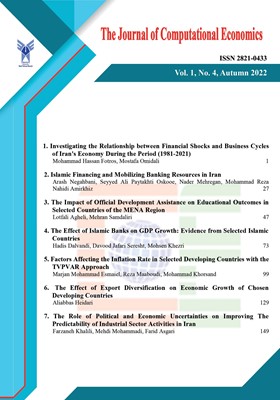The Effect of Islamic Banks on GDP Growth: Evidence from Selected Islamic Countries
Subject Areas : Computational economics
hadis dalvandi
1
![]() ,
Davood Jafariseresht
2
,
Mohsen Khezri
3
,
Davood Jafariseresht
2
,
Mohsen Khezri
3
1 - Bu-Ali Sina, Hamedan, Iran
2 - Department of Economics, Faculty of Economics and Social Sciences, Bu-Ali Sina university, Hamedan,Iran
3 - Department of Economics, Faculty of Economics and Social Sciences, Bu-Ali Sina university, Hamedan,Iran
Keywords: , , : Islamic Banks, , GDP Growth, , Islamic Countries, , PVAR Model,
Abstract :
Today, the banking sector is one of the most important pillars of the financial sector. In this study, while expressing the theories related to the relationship between Islamic banking and GDP growth, the effect of loans from Islamic banks as an indicator of Islamic banking activities on the GDP growth of 20 selected Islamic countries for the period of 2010-2017 has been evaluated and the panel vector autoregression model has been used in order to investigate the effect of variables of total banking activity, Islamic banking activity, inflation rate, government expenditures, trade openness and institutional quality on GDP growth. The results show that the relationship between Islamic banking activity and GDP growth is positive and significant. Also, the effect of inflation rate, institutional quality and trade openness on GDP is positive and significant and the effect of government expenditures and total banking activity on GDP growth is negative and significant. Therefore, countries with sound macroeconomic and institutional policies (prudent government expenditures, good regulatory frameworks and high institutional quality) have higher GDP growth.
_||_


